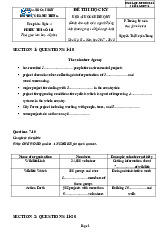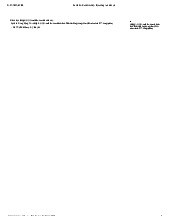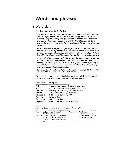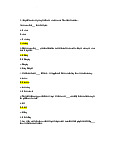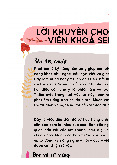






Preview text:
CHUYÊN ĐỀ 1: TENSES I. Lý thuyết Tenses Forms (Công thức)
Usage (Cách sử dụng) Signals ( (Thì) Present Động từ tobe:
- Diễn tả thói quen, hành động lặp đi lặp lại. - Các trạng từ simple (+) S + is/ am/ are + O. Ex: I go to school everyday Always, usua
(-) S + is/ am/ are + not + O.
- Diễn tả chân lý, sự thật hiển nhiên. sometimes, h (?) Is/ am/ are + S + O? Ex: The Sun sets in the West - Các trạng từ
- Diễn tả những suy nghĩ, cảm xúc gian:
Động từ thường: Ex: I am happy. + Every (day/ (+) S + V-inf/ s/ es + O. month)
(-) S + do/ does + not + V-inf + O. + In the morn (?) Do/ does + S + V-inf + O? afternoon/ ev Present
(+) S + is/ am/ are + V-ing + O.
- Diễn tả một hành động đang diễn ra tại thời - Các trạng từ
continuous (-) S + is/am/are + not + V-ing + O. điểm nói. Now, right no
(?) Is/ am/ are + S + V-ing + O?
Ex: I’m learning English now at present, at
- Diễn tả một hành động nói chung đang diễn today, this we
ra và chưa kết thúc, nhưng không nhất thiết - Các câu cảm
phải thực sự diễn ra ngay lúc nói. Hurry up! Lo
Ex: I’m quite busy these days. I’m doing homework
- Diễn tả một hành động chắc chắn sẽ xảy ra
trong tương lai gần.
Ex: He is going to Ha Noi tomorrow. Present
(+) S + has/ have + Ved/ V3 + O.
- Diễn tả những hành động hoặc trạng thái gần + Before: trư perfect
(-) S + has/ have + not + Ved/ V3 + O. đây, hoặc những hành động đã xảy ra và một đã từng. Neve
(?) Has/ have + S + Ved/ V3 + O?
thời điểm không xác định trong quá khứ chưa bao giờ
Ex: Nam have bought a new house. + For + quã
- Diễn tả một những hành động hoặc trạng trong khoảng
thái bắt đầu trong quá khứ và tiếp tục cho đến đó (for years, hiện tại + Since + m
Ex: She has been a student for this school for 2 kể từ khi (sin years. (Since + QKĐ
- Diễn tả một hành động, sự việc vừa mới xảy + Yet: chưa, ra. dùng trong câ
Ex: We have just finished taking the test. nghi vấn
- Diễn tả sự việc mà kết quả của nó còn lưu lại + …the first
và ảnh hưởng đến hiện tại. time
Ex: She has broken her watch so she doesn’t + Just / Rece lOMoAR cPSD| 46884348 know what time it is. + Already: r + So far/ Un now/ Up to th tới bây giờ Past Động từ tobe:
- Diễn tả chuỗi hành động xảy ra trong quá - Các trạng từ simple (+) S + was/ were + O. khứ. trong quá khứ (-) S + was/ were + not + O.
Ex: I finished work, walked to the beach ago, last (wee (?) Was/ were + S + O?
- Diễn tả một hành động đã xảy ra trong quá year/…)
khứ, đã kết thúc rồi và biết rõ thời gian. - Những khoả
Động từ thường:
Ex: Mary went to Vietnam last summer. đã qua trong (+) S + Ved/ V2 + O.
- Diễn tả một hành động đã xảy ra liên tiếp this morning, (-) S + did not + V-inf + O.
trong suốt một khoảng thời gian trong quá - In + năm qu (?) Did + S + V-inf + O?
khứ nhưng hiện tại đã hoàn toàn chấm dứt. - When + QK
Ex: I worked as a teacher for six years before I getting married.
- Diễn tả 1 hành động xen vào 1 hành động
khác trong quá khứ. Hành động xen vào chia quá khứ đơn.
Ex: When I came home he was reading a book. Past
(+) S + was/ were + V-ing + O.
- Diễn tả một hành động hoặc sự việc xảy ra - By + giờ + t
continuous (-) S + was/ were + not + V-ing
tại một thời điểm xác định trong quá khứ. Sự quá khứ + O.
việc ấy vẫn tiếp diễn cho đến một thời điểm - While + QK
(?) Was/ were + S + V-ing + O? khác. (diễn tả 2 hd
Ex: At 9 pm, my family was watching TV. song cùng 1 l
- Diễn tả hai hay nhiều hành động đang xảy ra - When + QK
đồng thời trong quá khứ. - While + QT
Ex: I was reading while he was listening to (diễn tả 2 hd music. ra trước chia
- Diễn tả một hoạt động đang diễn ra thì bất xảy ra sau chi
chợt có hành động khác xen vào.
Ex: When Linh came, I was cooking dinner.
- Khi hai hành động cùng xảy ra trong quá - by + trạng t Past (+) S + had + Ved/ V3 + O.
khứ, hành động xảy ra trước dùng quá khứ - S + told/ sai Perfect
(-) S + had + not + Ved/ V3 + O.
hoàn thành và hành động xảy ra sau sử dụng QKHT (?) Had + S + Ved/ V3 + O? thì quá khứ đơn. - Các liên từ n
Ex: I met him after he had graduated from Before/ By th college. As soon as:
- Sử dụng để diễn tả hành động đã xảy ra và - Before + QK
kéo dài đến một thời điểm nhất định trong quá - When/ By th
khứ hoặc trước một thời điểm nhất định trong QKĐ, QKHT quá khứ. - After/ As so
Ex: By the time we arrived, Lan had gone out. QKHT, QKĐ
- Dùng trong câu điều kiện loại ba để diễn ra
điều kiện không có thực ở quá khứ lOMoAR cPSD| 46884348
Ex: If I had enough money, I could have bought a new iphone. Future (+) S + will + V-inf + O.
- Diễn tả một quyết định, một ý định nhất thời - Các trạng từ simple (-) S + will not + V-inf + O.
ngay tại thời điểm nói. trong tương l (?) Will + S + V-inf + O?
Ex: It's raining heavily outside. I will close the next (week/ m window. soon, in the fu
- Diễn tả một dự đoán không có căn cứ, - Các cụm từ:
thường đi kèm với các động từ: think, expect/ ... suppose, guess, ... - Các từ: Prob
Ex: I think she will come to the party. - When/ befo
- Diễn tả một dự đoán, cảnh báo, đề nghị, hứa HTĐ, TLĐ
hẹn, đe dọa, yêu cầu, gợi ý, quyết định tại chỗ,
ý kiến, hi vọng, và nỗi sợ hãi.
Ex: Will you please bring me a cup of coffee?
I promise that I will tell you the truth.
- Sử dụng trong câu điều kiện loại một, diễn tả
một giả định có thể xảy ra ở hiện tại và tương lai
Ex: If it stops raining soon, we will go to the cinema. Future (+) S + will be + Ving + O
- Diễn tả một hành động, sự việc đang diễn ra - At this time continues (-) S + won’t be + Ving + O
tại một thời điểm nhất định trong tương lai. từ của tương (?) Will + S + be + Ving + O?
Ex: He will be traveling next Monday. - At + giờ cụ
- Diễn tả một sự hành động, sự việc đang diễn gian trong tươ
ra trong tương lai thì có một hành động, sự việc khác xen vào.
Ex: You come to his house tomorrow, he will be playing soccer.
- Diễn tả một hành động, sự việc sẽ diễn ra
theo thời gian biểu hoặc theo một phần của kế hoạch.
Ex: Tomorrow, I'll be working on my plans at 8 a.m.
II. BÀI TẬP VẬN DỤNG lOMoAR cPSD| 46884348
Bài 1. Chia các động từ sau ở thì Hiện tại đơn và Hiện tại tiếp diễn
1. What __________they (do) _________in the winter?
2. Now I (do)__________the cooking while Hoa (listen)___________to music.
3. At the moment, Nam and his friends (go)__________shopping at the mall.
4. On Friday, I (have)___________English.
5. He (like)___________apples, but he (not like)__________bananas.
6. Tom (be)_________my friend. He (play)____________sports every day.
7. He (teach)___________English in a big school in town.
8. We usually (read)_______books, (listen)______to music or (watch)________TV.
9. Look! They (run)___________together.
10. Keep silent! I (listen) ___________to the radio.
Bài 2. Chia các động từ sau ở thì Quá khứ đơn và Hiện tại hoàn thành
1. I (not see) _____________him last Monday.
2. Up to the present, we (write) _____________ almost every lesson in the book.
3. How many times _____________ you (see) _____________ him since he went to Edinburgh?
4. Mary (lose) _____________ her hat and she (look) _____________ for it until now.
5. I (read) _____________ the novel written by Jack London several times before.
6. He (write) _____________ a book since last year.
7. Mr Green. (teach) _____ English in this school since he (graduate) ______from the university in 1986.
8. My father (not smoke) _____________ for 5 years.
9. How long _____________Bob and Mary (be) _____________married?
10. She (win) _____________ the gold medal in 1986.
Bài 3. Chia các động từ sau ở thì Quá khứ đơn, Quá khứ tiếp diễn và Quá khứ hoàn thành
1. When the police (arrive) QKD , the car (go) HTHT
2. While we (do) ____________ a sight-seeing tour, our friends (lie) ___________ on the beach. QKTD
3. They (eat) HTHT everything by the time they (arrive) QKD at the party.
4. While Tom (play) _____________ the piano, his mother (do) ___________ the washing-up. QKTD lOMoAR cPSD| 46884348
5. I (go) QKD after they (finish) HTHT their work.
6. The light went out while I (have) QKTD dinner.
7. He (do) HTHT nothing before he (see) QKD me.
8. When they (get) QKD the station, the train (leave) HTHT
9. The house (catch) QKTD fire while they were sleeping.
10. While Tom was reading, Amely (watch) QKTD a documentary on TV.
11. The burglar (open) QKTD the safe when he (hear) QKD footsteps. He immediately (put)
QKD out his torch and (crawl) QKD under the bed.
12. Last night I (drop) QKD a plate when I (do) QKTD the washing-up. Fortunately it (not/break) QKD
13. Mary and I (dance) QKTD the house when the telephone rang.
14. I (open) QKTD the letter when the wind (blow) blew it out of my hand.
15. The boy fell and hurt himself while he (ride) QKTD a bicycle.
Bài 4. Chia các động từ sau ở thì Hiện tại đơn, Tương lai đơn và Tương lai tiếp diễn
1. When you (go) go into the office, Mr John (sit) sits at the front desk.
2. Our English teacher (explain) will explain that lesson to us tomorrow.
3. We (wait) will wait for you when you (get) _____________ back tomorrow.
4. What will you (do) do at 7:00 pm next Sunday? I
(practice) will practice my English lesson then.
5. When I see Mr Pike tomorrow, I (remind) will remind him of that.
6. When you (come) come next Monday, I (work) will be working at my desk. TLTD
7. He (work) will be working on the report at this time tomorrow.
8. Please wait here until you (see) see her.
9. The Browns (do) will be doing their housework when you (come) come next Sunday. TLTD
10. Don't leave until you (see) see her.
Bài 5. Chọn đáp án đúng nhất
1. He ___________to New York three times this year. A. was B. had been C. is D. has been
2. The second World War _________________in 1939. A. started B. starts C. has started D. start
3. We ______ as soon as you have finished your work. A. will go B. go C. went D. have gone
4. I ______ the book by the time you come tonight. lOMoAR cPSD| 46884348
A. will be finishing B. have finished
C. will have finished D. finished
5. Television ___________ very popular since 1950s. A. has been B. was C. had been D. is
6. Peter _____________ at the moment, so he can't answer the phone. A. has worked B. is working C. worked D. works
7. Don't go anywhere until I ______ back. A. came B. have come C. come D. will come
8. The King just ____________ here yesterday. A. had come B. comes C. has come D. came
9. It is the largest ship I_____________. A. had seen B. saw C. have ever seen D. see
10. At 8 o’clock this evening, my friends and I ________ a famous film in the cinema A. will watch B. watched
C. will be watching D. have watched
11. Mary ____________ an hour ago. A. phoned B. has phoned C. phones D. was phoning
12. This is the house that Jack _________ three years ago. A. was building B. builds C. had built D. built
13. Don't make noise. My mother ___________with her friends. A. talked B. talks C. is talking D. was talking
14. She ______ the piano since she was ten years old. A. played B. has played C. plays D. had played
15. Up to now, I ___________ a lot of information about her. A. learnt B. would learn C. learn D. have learnt
16. Mary ___________ in London for 15 years. A. lives B. was living C. is living D. has lived
17. I'm hungry now. I _________ anything today. A. didn't eat B. haven't eaten C. don't eat D. won't eat
18. When we arrived home last night, everybody __________ . A. has already slept B. had already slept C. was already sleeping D. already sleeping
19. Mark Twain _________ loved his wife before he met her. A. is B. was C. has D. had
20. How __________ since we left school? A. will you B. have you been C. are you D. are you being
21. They _________ a presentation at this time tomorrow morning. A. are making B. are going to make C. will be making D. will making
22. Mary ____________ an hour ago. A. don't see B. hadn't seen C. didn't see D. haven't seen
23. What will Nam do when he __________ school next year? A. could finish B. will finish C. has finished D. finishes
24. I ____________in Hanoi before I moved to HCM City. A. had been living B. had lived C. have lived D. have been living lOMoAR cPSD| 46884348
25. When I was a boy, I _____________tea to coffee. A. preferred B. was preferring C. have preferred D. prefer
26. He went back to work in his country after he ________his course on Advanced Engineering in London. A. was finishing B. finishes C. has finished D. had finished
27. He __________up his mind yet. A. hasn't made B. didn't make C. wasn't making D. wasn't make
28. I ______ TV while my father ______ a newspaper last night. A. am watching / was reading B. was watching / was reading C. am watching / is reading D. was watching / is reading
29. Tom and Mary _________for Vietnam tomorrow. A. have left B. leaving C. leave D. will leave
30. The science lessons in this class ________ difficult today. A. are B. be C. was D. is
31. - Peter, please help me do the washing up. - Sorry, Mum. I ______ TV. A. had watched B. am watching C. watched D. watch
32. He has _________ in giving up smoking. A. succeeds B. succeed C. succeeded D. succeeding
33. While I ____________TV last night, a mouse ran across the room. A. was watching B. am watching C. watched D. watch
34. It rained yesterday after it _____________ dry for months. A. is B. will be C. had been D. has been
35. I’m going on holiday. This time next week I _______on the beach in the sea. A. will lie B. am lying C. will be lying D. lie
36. We must start now. The next train _________ at 2:15 p.m. A. will leave B. has leave C. left D leaves
37. The motorway ____ in 1986. A. finished B. has finished C. finishes D. was finished
38. What were you ___________ at 8:00 last night? A. do B. doing C. done D. did
39. She'll be a millionaire by the time she _____ forty. A. was B. will be C. is D. is going to be
40. People ________ English and French in Canada. A. are speaking B. had spoken C. have spoken D. speak
